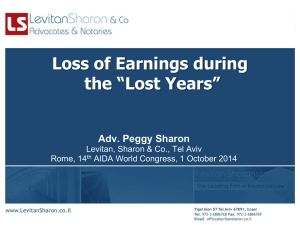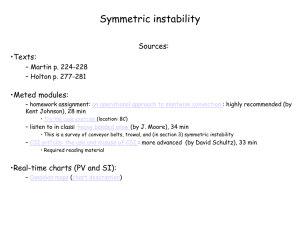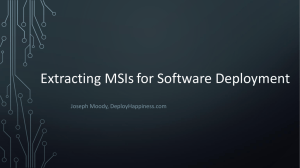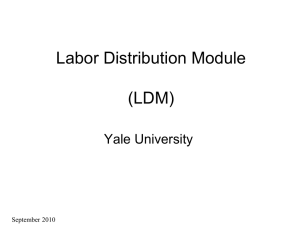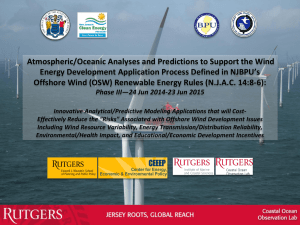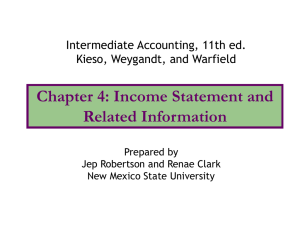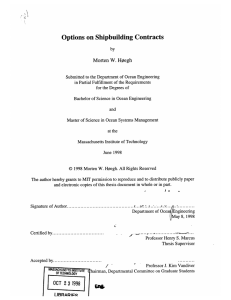MSI Infield Joint Venture 2013 04
advertisement
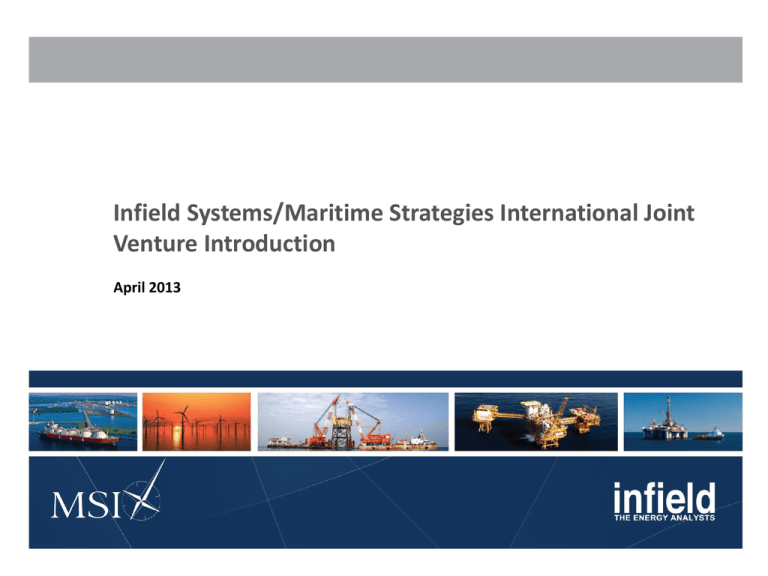
Infield Systems/Maritime Strategies International Joint Venture Introduction April 2013 Table of Contents I. II. III. IV. V. VI. 2 Introductions a) Infield Systems b) Maritime Strategies International Data Collection and Benchmark Coverage a) Data Processing Newbuilding Prices Secondhand Prices Clients and Asset Types Administration SECTION I Company Introductions Infield Systems Productions & Services A leading offshore O&G and associated services consultancy Data, Reports & GIS Mapping • • • Offshore specific data covering production infrastructure, rigs, specialist vessels, construction yards, contracts and OFS providers Sector specific reports GIS mapping services covering operational and forecasted production infrastructure 4 Business Strategy and Analysis • • • • • • Market matching and market tracking – “Match & Track” Complete market intelligence outsourcing Bespoke sector services Market entry strategy Procurement strategy advisory – “Project Flow” Ad-hoc sector analysis Transaction Services • • • • • • Pre IPO due diligence Market overview IPO Debt financing analysis Distressed asset purchases Buy/sell side market due diligence Opportunity identification Products & Services – Market Reports Infield publish a range of market reports covering various aspects of the O&G, renewables and associated marine industries Regional Reports • • • • • • Arctic Asia Australasia Latin America Middle East North America Global Perspectives • • • • • Deepwater Fixed Platforms Floating Platforms Pipe & Control Lines FPSOs Specialist markets • • • • • • • Offshore Heavy Transport Heavy Lift LNG Wind ROVs Construction Vessels Subsea Well Intervention The market update reports provide detailed information, analysis and insight into market trends over the next five years, which is presented in a manageable, clear and concise manner. The integration of the Offshore Energy Database, the Specialist Vessels Database, the construction and fabrication yards database, the drilling rigs database along with Infield's OFFPEX™ Market Modelling and Forecasting System means that each report contains uniquely detailed and up to-date analysis. Within each market update a five year forward forecast is provided with a five year history 5 Maritime Strategies International Introduction Leading independent market forecasting, research and consultancy firm within the shipping industry Data, Reports and Models • • • • • • Sector specific reports Interactive forecasting models for all major shipping sector Supply and demand data by cargo by trade route Time series data for prices, rates and OPEX Transaction data Shipbuilding 6 Business Strategy and Analysis • • • • • • • Restructuring benchmarking Project evaluations and market entry strategy Trade and market share projections Financing and investment prospectuses Expert testimony/litigation support Vessel size and route evolution Market risk and sensitivity analysis Valuations • • • • Independent spot and forecast valuations Charter attached valuations Earnings and operating cost forecasts Coverage includes all merchant ship types and sizes as well as offshore vessels and units Maritime Strategies International Introduction MSI publish a range of proprietary forecasting models and market reports covering all aspects of merchant shipping Monthly/Quarterly Reports • • • • • • • Tanker Shipping Planning Service Report Bulker Shipping Planning Service Report Container Shipping Planning Service Report Shipbuilding Planning Service Report Freight Forecaster – Tankers Freight Forecaster – Dry Bulk Marketing Strategy Intelligence Service Quarterly Models • • • • • • • • • • • Tanker Shipping Planning Service Model Bulker Shipping Planning Service Model Container Shipping Planning Service Model Shipbuilding Planning Service Model Chemical Tanker Market and Trade Model LPG Carrier Market and Trade Model Car Carrier Model Reefer Model Short Sea Shipping Model Open Hatch Bulker Model Shuttle Tanker Model Specialist Areas • • • • • • • • • Business Advisory Investment Strategies Strategic Consulting Credit Risk Modelling Financial Modelling Stochastic Modelling Project Financing Cruise Industry Outlook Ports and Infrastructure MSI’s quarterly reports provides readers with a comprehensive, independent guide to medium-term market interrelationships, complementing historical and forecast data from MSI's latest scenarios with in-depth text and charts highlighting and analysing market dynamics and forecast risks. Each report covers five years of historical data and five years of forecast data. MSI's Shipping Planning Services models are fully interactive menu-driven modelling system for each sector. They provide a platform to access easily and quickly historic and forecasted data (1980 to 2025) as well as a powerful analysis and simulation tool that enables the use of alternative assumptions to test market sensitivities and primary risks by modifying a wide range of macroeconomic, supply and demand inputs. 7 Geographic Locations A globally recognised group with a dedicated international team of cross-sector specialists Office Locations Key Global Personnel Michael Payne (Managing Director - MSI) London michael.payne@msiltd.com +44 207 940 0079 James Hall (Director - Infield) London james.hall@infield.com +44 207 423 5024 Aberdeen London Gregory Brown (Consultant - Infield) London gregory.brown@infield.com +44 207 423 5032 Adam Kent (Director - MSI) London adam.kent@msiltd.com +44 207 940 0074 Houston Singapore Head Office Regional Office JV/Representative Office 48 Energy/Shipping Professionals covering all geographic regions 8 Roger Bartlett (Managing Director - MSI Asia) Singapore roger.barlett@msiltd.com SECTION II Data Collection & Benchmarking Data Sources/Methodology Infield compiled and collates publically available data to provide an offshore activity forecast • • • Infield Systems houses a number of databases developed over the course of the last 25 years. Our data is compiled from publically available sources: ‐ Trade journals ‐ Financial reports ‐ Operator statements ‐ Oilfield service contractors ‐ Legislative bodies ‐ Financial institutions The sources are collated and timelines reviewed. Infield take operator schedules and apply a supply chain analysis: ‐ We take into account: ‐ Fabrication yards ‐ Rig supply ‐ Construction vessel supply ‐ Engineering ‐ Competing projects ‐ Commodity price sensitivity Our forecasts are then ‘peer reviewed’ by our clients – subsea OEMs, OFS groups, Operators. Our forecasts are therefore defined as ‘viable’ and it is these which drive our dayrate and valuation methodology ‐ Dayrates are historically researched – investor reports, drilling unit statement etc and then modelled for future earnings ‐ Model rates are driven by base factors multiplied by market factors – supply/demand, complexity of work etc ‐ Complexity of work driven by Infield databases – wells, platforms etc to highlight future demand 10 Data Processing • Primary data supplied by Infield Systems ‐ Dayrates ‐ Utilisation ‐ Fleet size • Primary data supplied with additional data from databases, publications, broker data and desktop research • Data verified, archive searches, outliers removed • Adjustments made for size and age • Generic benchmark data series updated on a quarterly basis Offshore Price Series Maintained Timeseries data maintained across support vessels, drilling units and production platforms Newbuild contract price, 5, 10 and 15 year old price, scrap price, earnings and Opex updated quaterly 11 • Anchor Handling Vessels ‐ 5/8k BHP ‐ 8/10k BHP ‐ 12/16k BHP ‐ 16/20 BHP • Semi-sub Drilling Rig ‐ 3rd Generation ‐ 5/6th Generation • Platform Supply Vessels ‐ 2/3k DWT ‐ 3/4k DWT ‐ 4/5k DWT • Drillship ‐ 10k ft Water Depth • Jack-up Drilling Rig ‐ 300ft • FPSO ‐ 100k DWT ‐ 300k DWT What Determines Secondhand Prices? Current replacement cost, earnings and residual scrap values are taken into account Current Replacement Cost • Independent Variables ‐ Yard prices; unstable, major market risk • Researched figures from contracts Used to define upper limit 12 Earnings • Independent Variables ‐ Dayrates ‐ Utilisation ‐ Expected vessel life • Researched figures from contracts and modelled for future earnings Used to define the depreciation rate Residual Scrap Value • Independent Variables ‐ S/LDT; limited influence or Up/downside risk • Researched figures from contracts Used to define the price floor SECTION III Newbuilding Prices Newbuilding Prices Based on the data feeds MSI generate consistent newbuilding price data – asset types strongly correlated Semi-sub Timeseries vs. Actual Contracts ($m) • Even if no units are contracted or units are of benchmark size MSI publish prices based on historical relationships between similar asset classes and size/spec adjustment criteria 800 700 600 500 400 • Generate price for all contracts even if no published price 300 200 • Even though assets types are very heterogeneous in size, design and price there is a very good correlation between benchmark offshore newbuilding prices annually 100 0 1998 1999 2000 2001 2002 2003 2004 2005 2006 2007 2008 2009 2010 2011 MSI Benchmark Price Average Reported Contract Price Contract Prices Across Offshore Asset Types ($m) Average cross correlation = 0.95 80 800 60 600 40 400 20 200 0 0 1998 1999 2000 2001 2002 2003 2004 2005 2006 2007 2008 2009 2010 2011 PSV 2/3k Dwt AHTS 16/20k BHP Semi Sub Rig 5th/6th Gen (RHA) 14 AHTS 5/8k BHP Drillship (RHA) Jack Up Rig 300ft (RHA) Newbuilding Prices Offshore asset prices move together and are correlated to conventional shipping due to ubiquitous drivers for the two Contract Prices Across Offshore and Shipping ($m) • The correlation extends beyond just intra-offshore units and shows a strong alignment between offshore and merchant shipping • This is perhaps unsurprising as the are ubiquitous drivers between the two i.e. ‐ Relationship between yard space and order book ‐ Costs (labour, steel, machinery etc.) 200 800 150 600 100 400 50 200 0 0 1998 1999 2000 2001 2002 2003 2004 2005 2006 2007 2008 2009 2010 2011 VLCC 6.6kTEU FCC 100kDwt FPSO (RHA) Average cross correlation = 0.90 Cape Semi Sub Rig 5th/6th Gen (RHA) Newbuilding Prices Actual and Modelled ($m) • MSI’s modelled newbuilding price is a very good indicator of actual newbuilding prices historically ‐ Absolute % difference over the past 14 years in just 8% (excluding 2004 and 2005 brings the difference down to 5%) ‐ MSI is able to generate indicative newbuilding prices using the three inputs at any point in time 800 700 600 500 400 300 200 100 0 1998 1999 2000 2001 2002 2003 2004 2005 2006 2007 2008 2009 2010 2011 5th/6th Semi Sub (Historical) 5th/6th Semi Sub (Modelled) 15 Model Generated Cross Check A cross check is supplied to independently verify report prices which can be prepared even if no contracts were placed • An assessment of the current day newbuilding price can therefore be generated even if no assets of a similar size/type have been contracted recently • Even if there are no comparable contracts a model generated view offers an independent cross check to verify reported prices • Newbuilding price can be modelled using three primary drivers: Costs Forward Cover Oil Price • Explicit assumptions on: ‐ Exchange rates, interest rates, wage inflation, equipment inflation, steel price, productivity • Shipyard capacity demand balance (measured in years) which is based on: ‐ Capacity by major region, capacity elasticity, forecast contracting • Oil price is a leading indicator dictating E&P spending and field procurement ‐ Oil price • MSI collate and process data from a large range of sources and build up consistent timeseries based on actual observations for a range of benchmark units/rigs • If no contracts were placed or we are unable to obtain contract prices these are assessed based on movements in prices exhibited by comparable sectors • Newbuilding prices can be cross checked using three input drivers weighted based on historical relationships (cost, yard availability and oil price). As MSI monitors these on a quarterly basis indicative newbuilding prices can be calculated at any point in time 16 SECTION IV Secondhand Values Replace Cost and Net Replacement Value Replacement costs and net replacement values are key inputs in deciding secondhand values • Given the variability in newbuilding prices the depreciation of the asset has to assessed in isolation from both the newbuilding and scrap price. This is called the Net Replacement Value: ‐ The rate at which an asset depreciates is dictated to be the earnings environment, when earnings are high the depreciation approaches a straight line and when earnings are poor the depreciation is concaved ‐ Using historical transaction data the dynamics of the curve can be calculated based on known net earnings at the time of sales ‐ With limited sales data comparable sectors can be aggregated to give better coverage 2011 Drillship Price by Design Average Price (Mn US$) Water Depth (ft) DSME 1000 580 10k Gusto MSC P10000 610 10-12k Samsung 12000 Huisman GT-10000 600 570 10-12k 10k Design Net Replacement Value Over Time 120 100 80 NRV (%) • The starting point of any valuation involves working out the replacement cost at the time of valuation i.e. how much would it cost to place a new order at a yard for a replica unit ‐ Starting off using MSI’s benchmark prices we are able to tailor these price to match a specific unit given either the specification and technical parameters or the design based on historical evidence such as 2011 drillship prices by design 60 40 20 0 0 5 10 15 High Earnings Environment 18 20 Age at Sale 25 30 35 Low Earnings Environment 40 Net Replacement Value and Depreciation Relationship Net replacement value is used alongside depreciation to accurately model market dynamics Semi-sub 5 year old NRV vs. Net Earnings (USDm) • NRV = (2𝑛𝑑 ℎ𝑎𝑛𝑑 𝑝𝑟𝑖𝑐𝑒 − 𝑠𝑐𝑟𝑎𝑝 𝑝𝑟𝑖𝑐𝑒 𝑖𝑛 𝑦𝑒𝑎𝑟 𝑜𝑓 𝑠𝑎𝑙𝑒) (𝑁𝑒𝑤𝑏𝑢𝑖𝑙𝑑𝑖𝑛𝑔 𝑝𝑟𝑖𝑐𝑒 𝑖𝑛 𝑦𝑒𝑎𝑟 𝑜𝑓 𝑠𝑎𝑙𝑒 − 𝑠𝑐𝑟𝑎𝑝 𝑝𝑟𝑖𝑐𝑒 𝑖𝑛 𝑦𝑒𝑎𝑟 𝑜𝑓 𝑠𝑎𝑙𝑒) • Depreciation is not static and using SLD would have underestimated modern rig values over the last 6 years and overvalued at start of last decade • Earnings environment meant owners would be prepared to pay significant premium for modern tonnage with immediate availability 19 500 110% 450 105% 400 100% 350 95% 300 90% 250 85% 200 80% 150 75% 100 70% 50 65% 0 60% 1998 1999 2000 2001 2002 2003 2004 2005 2006 2007 2008 2009 2010 2011 5 Yr Old NRV (RHA) Net Earnings Modelled Secondhand Prices and Considerations The exact price of a secondhand asset is influenced by a range of market factors • The secondhand value is based on a number of factors including: ‐ Exact specification and age of asset ‐ Yard and location of build, including track record ‐ Replacement cost and time from ordering to delivery (by sub component where necessary i.e. hull, topside, engineering, supervision costs etc. ‐ Current and future earnings potential/utilisation rates ‐ Scrap price (both $LDT and cannibalisation potential) ‐ Life expectancy ‐ Maintenance schedule ‐ Recent transaction prices and any specifics relating to those transactions • These data are either contained in MSI or Infield Systems databases and can be used to assess each unit on a caseby-case basis with premium and/or discounts applied • MSI is then able to cross check the calculated valuation as described above with a model generated valuation • The model algorithms utilise the relationships between net earnings, newbuilding prices and scrap prices 20 Actual vs. Model Secondhand Prices (US$) 800 700 600 500 400 300 200 100 0 1998 1999 2000 2001 2002 2003 2004 2005 2006 2007 2008 2009 2010 2011 5 Yr Actual 5 Yr Calc SECTION V Data Users Clients Using MSI Offshore Price Data and Certificates Clients across private equity, investment and retail banks valuing assets including rigs, support vessels and production platforms Clients and Asset Types Values Support Vessels • • • Anchor Handlers Platform Supply Tug Workboat 22 Construction Vessels • • • • • Heavy Lift Pipelay Dive Support Well Intervention Multifunctional Drilling Units • • • Drillship Semi-sub Jack-up Production Platforms • • • • FPSO FSO FSRU FLNG Export Vessels • Shuttle Tanker SECTION VI Administration Disclaimer The information contained in this document is believed to be accurate, but no representation or warranty, express or implied, is made by Infield Systems Limited as to the completeness, accuracy or fairness of any information contained in it, and we do not accept any responsibility in relation to such information whether fact, opinion or conclusion that the reader may draw. The views expressed are those of the individual contributors and do not represent those of the publishers. Some of the statements contained in this document are forward-looking statements. Forward looking statements include, but are not limited to, statements concerning estimates of recoverable hydrocarbons, expected hydrocarbon prices, expected costs, numbers of development units, statements relating to the continued advancement of the industry’s projects and other statements which are not historical facts. When used in this document, and in other published information of the Company, the words such as "could," "forecast”, “estimate," "expect," "intend," "may," "potential," "should," and similar expressions are forward-looking statements. Although the Company believes that its expectations reflected in the forward-looking statements are reasonable, such statements involve risk and uncertainties and no assurance can be given that actual results will be consistent with these forward-looking statements. Various factors could cause actual results to differ from these forward-looking statements, including the potential for the industry’s projects to experience technical or mechanical problems or changes in financial decisions, geological conditions in the reservoir may not result in a commercial level of oil and gas production, changes in product prices and other risks not anticipated by the Company. Since forward-looking statements address future events and conditions, by their very nature, they involve inherent risks and uncertainties. © Infield Systems Limited 2013 24
